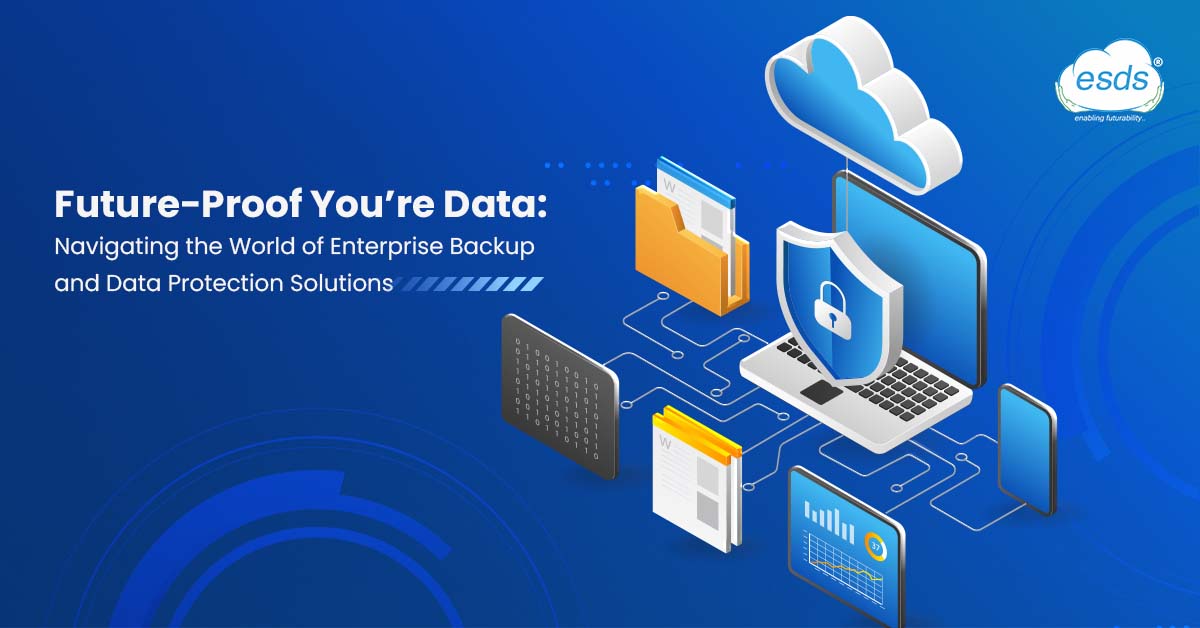Future-Proof You’re Data: Navigating the World of Enterprise Backup and Data Protection Solutions

In an era where data breaches, system failures, and unexpected disasters loom, businesses across industries must proactively implement robust data protection and enterprise backup solutions. This blog serves as your guide to understanding the critical role that enterprise backup solutions play in safeguarding valuable information. We will navigate the intricate challenges and complexities of data security, offering insights into best practices and emerging trends in the field. Whether you’re a small startup or a large enterprise, discovering how to future-proof your data is vital for ensuring business continuity and staying ahead of the competition. Join us as we unravel the intricacies of data protection and delve into the ever-evolving landscape of enterprise backup solutions. Let’s embark on this transformative journey together, equipping ourselves with the knowledge and strategies to safeguard our digital assets.
In today’s business landscape, enterprise backup plays a pivotal role in safeguarding and maintaining the accessibility of invaluable data and information. The necessity for robust backup solutions stems from multiple factors, including the relentless growth in digital data volume, the increasing complexity of IT systems, and the mounting threats posed by data loss or corruption. These threats encompass a wide range of potential hazards, such as hardware failures, cyberattacks, natural disasters, and human errors.
The sheer magnitude of digital data generated by organizations demands an effective backup strategy to mitigate risks and ensure data resilience. As IT systems become more intricate, the potential points of failure also multiply, making data vulnerability a pressing concern. Without a comprehensive backup solution in place, businesses are exposed to substantial risks, including prolonged periods of downtime, financial losses, reputational damage, and legal ramifications. Furthermore, enterprise backup enhances business continuity and disaster recovery capabilities, facilitating the rapid restoration of operations during disruptive events. Additionally, it fosters compliance with regulatory standards, particularly in industries with stringent data retention and privacy mandates.
Importance of Having Backup Solutions

Furthermore, backup solutions play a crucial role in enabling long-term data archiving, which in turn supports various essential business functions. By securely storing data over extended periods, enterprise backup facilitates historical analysis, enabling organizations to gain valuable insights from past trends and patterns. This archived data also contributes to meeting legal compliance requirements, ensuring that organizations adhere to data retention regulations. Moreover, the availability of comprehensive data archives empowers strategic decision-making processes, as it provides a wealth of information for informed planning and resource allocation.
In essence, the implementation of enterprise backup solutions empowers organizations with the confidence to effectively navigate unforeseen challenges and mitigate risks. By safeguarding the integrity and availability of critical data assets, backup solutions become a cornerstone of data-driven business operations. With the assurance of robust backup systems in place, organizations can focus on their core objectives, innovate with peace of mind, and maintain a competitive edge in today’s rapidly evolving digital landscape.
While there are several benefits for Enterprise backup and data protection solutions, let’s check the three significant advantages to organizations:
- Minimizing Downtime and Mitigating Financial Losses: Implementing robust backup systems enables businesses to swiftly recover lost or corrupted data. This capability minimizes downtime and prevents extensive disruptions to operations. By promptly restoring critical information and systems, organizations can maintain productivity, avoid financial losses associated with prolonged inactivity, and ensure uninterrupted business continuity.
- Enhancing Business Continuity and Enabling Effective Disaster Recovery: Reliable backup solutions play a crucial role in ensuring business continuity during disruptive events. By having backup systems in place, organizations can quickly restore critical data and IT infrastructure following incidents such as cyberattacks, hardware failures, or natural disasters. This capability allows businesses to resume operations promptly, minimize the impact of disruptions, protect their reputation, and uphold high levels of customer service.
- Ensuring Regulatory Compliance and Safeguarding Data Security: In today’s regulatory environment, organizations face stringent data retention, privacy, and security requirements. Enterprise backup and data protection solutions assist organizations in meeting these compliance standards. By securely storing and safeguarding sensitive information, organizations can maintain data integrity, prevent unauthorized access, and protect customer trust. Ensuring regulatory compliance not only helps avoid penalties and legal consequences but also strengthens the organization’s reputation and credibility.
Types of Backups You Must Know:

- Full Backup: Creates a complete copy of all data and files, enabling easy restoration. It provides comprehensive data backup but requires more time and storage space.
- Incremental Backup: Stores only changes made since the last backup, reducing backup time and storage requirements. However, restoration may take longer due to multiple backup sets.
- Differential Backup: Saves changes made since the last full backup, offering faster restoration compared to incremental backups. However, it requires more storage space as the backup set grows.
- Mirror Backup: Generates real-time replicas of source data, ensuring immediate reflection of changes. It allows for rapid recovery but consumes significant storage resources.
- Cloud Backup: Stores data backups in remote cloud-based storage, providing off-site protection, scalability, and accessibility. It allows data restoration from anywhere with an internet connection.
- Hybrid Backup: Combines multiple backup types or storage mediums to create a comprehensive data protection strategy.
While it may be impossible to completely prevent data loss, organizations can minimize the impact of data sprawl through effective solutions. To ensure compliance, recover lost data, and have reliable backups, organizations require an automated system that can efficiently handle these tasks. By implementing such a system, organizations can streamline their data management processes and mitigate the risks associated with data loss and sprawl. With an automated system in place, organizations can enhance their data governance practices, reduce the potential for errors, and ensure the integrity and availability of their data assets.
- Unlocking Data’s Time Machine: The Importance of Database Point-in-Time Recovery - August 2, 2023
- Future-Proof You’re Data: Navigating the World of Enterprise Backup and Data Protection Solutions - July 7, 2023
- Unleashing the Potential of Long-Term Data Retention: Exploring Trustworthy Backup - May 31, 2023
